The story of Jesus’ death and resurrection raises accusations that Christianity is obsessed with blood. Many believers struggle with this too. Byron Barlowe explores the biblical reasons for the focus on Christ’s blood and why its shedding was necessary.
The Bloody Cross: A Tough Thing to Handle
 Easter season is all about the death and resurrection of Christ—which centers on the blood sacrifice He endured. Christianity is called a bloody religion, focusing on the execution of Jesus Christ on a cross. Why is this true and what does it mean when we say His blood atones for our sin?
Easter season is all about the death and resurrection of Christ—which centers on the blood sacrifice He endured. Christianity is called a bloody religion, focusing on the execution of Jesus Christ on a cross. Why is this true and what does it mean when we say His blood atones for our sin?
Millions of Americans—and billions of Christians around the world—celebrated the death and Resurrection of Christ during Passion Week and Easter Sunday. The topic was everywhere from sermons to a CNN docudrama titled Finding Jesus: Faith, Fact, Forgery.
You may have questions about all the talk of “the blood of Christ” and songs saying things like “Jesus’s blood washed away my sins.” This bloody theme does raise understandable concerns that are shared by believers, seekers and skeptics alike.
In fact, more and more skeptics are posting on the Internet things like this book promotion:
“Christians are obsessed with blood! They sing about it, declare they are washed in it and even drink it! In this book you will discover the crazy background to this Christian obsession and the truth about the bloodthirsty God they claim to know and serve.”{1}
In this article, we’ll discuss whether these charges are true and fair and explain the doctrine of blood atonement.
Again, even many Christians—including me—have wondered deeply about all the biblical imagery of shed blood, what some call the Crimson Thread of Scripture. I mean the grotesqueness of Old Testament animal sacrifice and the belief in Jesus’s torturous slaying as the core of salvation. Radical stuff for modern ears.
So what is blood atonement and why does it matter? In historic orthodox Christian thought, God’s Son is at the very center of history doing these things:
• reconciling man to God,
• ransoming humans from slavery to sin and well-deserved death and
• justly recompensing God for the horrific offense of rebellion and disobedience to Him.
Thankfully, the gospel (or good news) is simple. The Bible claims, “Christ also died for sins once for all, the just for the unjust, so that He might bring us to God, having been put to death in the flesh, but made alive in the spirit.”{2}
The bottom line for all people is this: out of Christ’s death came the hope of eternal life—and His resurrection proved this. Our sin caused God’s Son to suffer and die. By grace, through faith, we can benefit. Otherwise, we suffer eternally for staying with the cosmic rebellion that started in a perfect Garden long ago.
Yet, this blood-centered good news is a scandal to both those who believe and those who deny it. In fact, the Greek root word skandalon is used for Christ Himself.{3} You see, Jews denied Christ as the Promised One and Gentiles thought it was all nonsense. Nothing has changed for mankind: the choices are either do-it-yourself religion, being too smart for all that, or believing in this radical hope.
The Reason Someone Had to Die
Why did anybody have to die? God’s justice and holiness demands a death penalty for the sinner.
We are all in a serious spiritual and moral pickle. Biblical Christianity declares that each person ever born is stuck under an irreversible “sindrome” for which there is no human answer. History sadly records the habitual and continual effects of sin: oppression, addictions, self-promoting power plays, deceit, war, on and on.
Now for a reality check: no moral order, either in a family, a company, military unit or society survives ambiguity or failure to enforce laws. Just ask the victims of unpunished criminals set loose to perpetrate again. If the Creator were to simply wink at sin or let people off scot-free, where would justice be? What kind of God would He be?
God is holy and He called Himself the Truth. There is no way God would be true to Himself and the moral order He created and yet fail to punish sin. Such impunity would mock justice. As one theologian puts it, “Pardon without atonement nullifies justice . . . A law without penalty is morally unserious, even dangerous.”
Ok, but penalties have levels of harshness. Why is death necessary? Scripture spells out clearly the decree that sinners must die. In God’s original command He stated, “When you eat of [the tree of the knowledge of good and evil] you will surely die” (Genesis 2:17). In Ezekiel the same formula appears slightly reworded: “The soul who sins is the one who will die” (Ezekiel 18:4, 20). Paul boiled it down this way: “For the wages of sin is death” (Romans 6:23).
God’s justice and holiness demand death for sin. Blood must be shed. Detractors of the cross tend to underestimate sin and know nothing of its offense to a holy God. Everyone wants justice—for others.
Ok, so what does a just and holy God do with impure, treasonous creatures He made to bear His image? God was in a quandary, if you will.
Yet, even in the Garden, He was already hinting at a plan to reconcile this dilemma. “God so loved the world” that he sent down His own Son as a man to pay the death penalty.{4}
Thomas Oden writes, “God’s holiness made a penalty for sin necessary . . . Love was the divine motive; holiness [was] the divine requirement. [Romans 5:8 reads] ‘God demonstrates His own love for us in this: While we were still sinners, Christ died for us’. [And as Romans 8 teaches,] This love was so great that God ‘did not spare His own Son, but gave Him up for us all’ (Romans 8:32).”{5}
Christ’s Death and Resurrection Was Unlike Other Religious Stories: It Was All for Love
God’s morally just demand for a death-payment is not the same as pagan gods, who maliciously demanded sacrifices. True for one big reason:
Isn’t this crucifixion thing simply about a grouchy god acting all bloodthirsty, as some atheists like popular author Richard Dawkins say? Should good people find this repugnant? One unbelieving critic wrote,
“Unfortunately, much of Christian art consists of depicting the sufferings and agony of Jesus on the Cross. This reflects the obsession of Christianity with the Crucifixion . . . “Crosstianity” [in the contemptuous words of one skeptic]. The obsession with ‘our sins’ having been ‘washed away by the Blood of the Lamb’ would be regarded as evidence of a serious mental illness . . . but when this is an obsession of millions of people it becomes ‘religious faith’.”{6}
Wow! Did you know that you, if you are a believer, are part of an insane global crowd? This vividly illustrates the scandal of the cross: “which is to them that are perishing foolishness” as the Apostle Paul described it.{7}
No, biblical sacrifice is not a bloodfest, but the way to deal with a sad reality. Put it this way: If God said, “Nah, don’t worry about rebelling against your Creator,” would that be a just and righteous God? Would a deity who fails to punish wrongdoing be worth following? Would His laws mean anything? Yet, we are unable to keep laws, so He steps in to pay that penalty. With His lifeblood. This storyline is utterly unique in the long human history of religions. And the resurrection Christians celebrate shows its truth in actual time and on this dirty earth.
Pagan myths of savior gods who rise from the dead have only a surface resemblance to the biblical resurrection. Such deities are more like impetuous and tyrannical people than the one and only Yahweh. The biblical God’s love fostered the unthinkable: set up a sacrificial system for a one-of-a-kind people—the Israelites—that served as a foretelling of His coup de grace: dying in man’s place as the spotless sacrificial Lamb. What a novel religious idea that only the true God could dream up! Theologian Thomas Oden says it this way: “It was God who was both offering reconciliation and receiving the reconciled.”{8}
God’s merging of perfect holiness, just retributive punishment and allowance of His Son’s execution was actually a beautiful thing. Francis of Assisi wrote that “love and faithfulness meet together [at the cross]; righteousness and peace kiss each other. Faithfulness springs forth from the earth, and righteousness looks down from heaven.”{9}
But Why a Violent, Bloody Death?
I get that death was demanded of someone to pay for sin. So why a bloody suffering and execution? Why the constant shedding of blood?
Mel Gibson’s The Passion of the Christ hit movie theaters in 2004 to mixed reviews. It earned its R-rating for gory bloodshed and, ironically, became a cultural scandal itself. Seems that the bloody realism was too much for both soft-core Christians and high-minded unbelievers. But this vividly poignant portrayal of Christ’s blood-stained Passion did raise a good question.
When it came to saving mankind, why the shedding of blood? Could God not have found another way? Church Father Athanasius believed that, if there were a better way to preserve human free will and still reconcile rebellious man to a holy God, He would have used it. Apparently, Christ’s suffering and death was the only solution.
The Apostle Paul summarized Christ’s entire earthly ministry this way: He “humbled Himself and became obedient unto death” (Philippians 2:8). At the cross, “human hate did all the damage it could do to the only Son of God.”{10} God used the realities available to Him, including the masterfully grim method of crucifixion, honed to a fine art by Roman pagans who viewed human life as dispensable.
Again, why is death demanded of God to atone for sin? The grounding for such a claim appears early in the Bible, after the murder of Abel by his brother Cain. In Genesis 9 Yahweh declares, “I will require a reckoning . . . for the life of man. Whoever sheds the blood of man, by man shall his blood be shed, for God made man in His own image.”{11} Apparently, God has put the price of a man’s life as that of another’s life.
The highlight of Christ’s death was its substitutionary sense. The Apostle Peter wrote, “For Christ also died for sins once for all, the just for the unjust, so that He might bring us to God, having been put to death in the flesh, but made alive in the spirit.”{12} Justice, fairness, reality itself demanded a bloodguilt payment for sin. Christ paid it.
Substitutionary sacrifice was nothing new for the Jews who unwittingly had the Messiah crucified. From the beginning of God’s dealings with His people, agreements were blood covenants. What else could carry the weight of such momentous things? And, as the book of Hebrews teaches, “Indeed, under the law almost everything is purified with blood, and without the shedding of blood there is no forgiveness of sins.“{13}
One theologian plainly said, “Through this sacrificial system, the people of Israel were being prepared for the incomparable act of sacrifice that was to come in Jesus Christ.”{14}
His suffering, death and resurrection conquered sin and neutered the fear of death. Only blood could clean sin; only God’s Son’s blood could do it perfectly and forever.
Here’s the scandal we spoke of: only a perfect sacrifice would do for washing mankind’s sins away and reconciling us back to God.
Beautiful Obsession: God Was Glad to Allow This Brutality for Us!
God said it was His pleasure to pay the death penalty with His own self, in the Person of His son. Christianity’s so-called blood-obsession is a beautiful picture of perfect divine love.
Theologian Thomas Oden summarized well our discussion of Christ’s blood atonement. He wrote, “Love was the divine motive; holiness the divine requirement. ‘God demonstrates His own love for us in this: While we were still sinners, Christ died for us’ (Romans 5:8).”
Such claims trump the understandable disgust of doubters. But the red blood leads to clean white.
Chick-fil-A restaurant employees are trained to say, “My pleasure” when serving customers. Imagine God saying that to believers regarding the cross of Christ! Paul explains in his letter to the Colossian church that “it was the Father’s good pleasure for all the fullness of deity to dwell in Him . . . having made peace through the blood of His cross . . . He has now reconciled you in His fleshly body through death . . .”{15}
God was glad to stand in as the essential scapegoat to restore us to right relations with Himself, to buy us back from slavery to sin, fear and death, and to abolish sin and its effects. This doesn’t sound like a bloodthirsty tyrannical deity demanding a whipping boy or abusing his own child, as some acidly accuse. “My pleasure” brings in new dimensions of lovingkindness and servant-heartedness.
But wait, there’s more! Scripture lists lots of wonderful effects created by the blood of Christ. These include forgiveness, propitiation or satisfaction of God’s righteous wrath, justification or being made right, reconciliation with God, cleansing, sanctification, freedom from sin, and the conquest of Satan.
Yes, you could say that Christianity is blood-obsessed. As accused, even its hymns often focus on the benefits bought at the highest of prices: the life of the God-Man Himself. One famous hymn goes:
For my pardon, this I see,
Nothing but the blood of Jesus;
For my cleansing this my plea,
Nothing but the blood of Jesus.
This beautiful blood obsession finds its highest hope in Revelation. The following is a prophecy about persecuted believers:
“These are the ones coming out of the great tribulation. They have washed their robes and made them white in the blood of the Lamb . . . For the Lamb in the midst of the throne will be their shepherd, and he will guide them to springs of living water, and God will wipe away every tear from their eyes.”{16}
Maybe the revelations here are as crazy as skeptics say. The foolishness of God. We believe they are the most glorious story ever told.
Notes
1. Promotion at Amazon.com for Obsessed with Blood: The Crazy Things Christians Believe, Book 1, by Ex-Preacher.
2. 1 Peter 3:18, NASB.
3. Romans 9:33, 1 Corinthians 1:23, 1 Peter 2:8.
4. John 3:16.
5. Oden, Thomas, Classic Christianity: A Systematic Theology (New York: Harper Collins, 1987), 405.
6. Meyer, Peter, “Why I Am Not a Christian”. Serendipity blog. Accessed 2-27-17, www.serendipity.li/eden/why_i_am_not_a_christian.htm.
7. 1 Corinthians 1:18.
8. Ibid., 414.
9. Ibid., 405.
10. Ibid., 389.
11. Genesis 9:4-6.
12. 1 Peter 3:18.
13. Hebrews 9:22-23, emphasis mine.
14. Oden, Classic Christianity, 413-414.
15. Colossians 1:19.
16. Revelation 7:14b-17, emphasis mine.
©2017 Probe Ministries
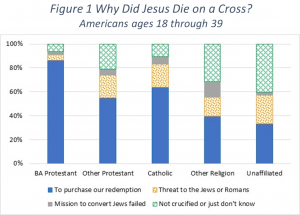 The responses for ages 18 through 39 are shown in Figure 1. As shown, Born Again Protestants have a far greater percentage, over 85%, stating that Jesus was crucified to purchase our redemption. One would suspect that all Protestant and Catholic leaders would want their people to know that Jesus’ death on the cross was for their redemption. Yet, less than two thirds of each group selected that answer. Note that the answer to this question did not say that salvation was through grace alone. So even those with a works-based gospel should still select that answer.
The responses for ages 18 through 39 are shown in Figure 1. As shown, Born Again Protestants have a far greater percentage, over 85%, stating that Jesus was crucified to purchase our redemption. One would suspect that all Protestant and Catholic leaders would want their people to know that Jesus’ death on the cross was for their redemption. Yet, less than two thirds of each group selected that answer. Note that the answer to this question did not say that salvation was through grace alone. So even those with a works-based gospel should still select that answer.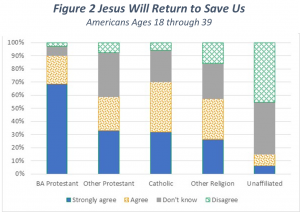 The results for this question follow a similar pattern to those for the first question above with a little less surety shown among Christians. As shown, just over two thirds of Born Again Protestants strongly agree that Jesus will return to save. Meaning that almost one third of them are not absolutely sure of Jesus’ return.
The results for this question follow a similar pattern to those for the first question above with a little less surety shown among Christians. As shown, just over two thirds of Born Again Protestants strongly agree that Jesus will return to save. Meaning that almost one third of them are not absolutely sure of Jesus’ return.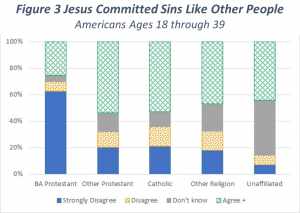 Young adult American beliefs about this statement follow a similar pattern as the first two questions. Once again, about one third of Born Again Protestants either Don’t Know or Agree with this statement. Having this large a number of Born Again Protestants who don’t accept a primary belief of Biblical Christianity is disappointing.
Young adult American beliefs about this statement follow a similar pattern as the first two questions. Once again, about one third of Born Again Protestants either Don’t Know or Agree with this statement. Having this large a number of Born Again Protestants who don’t accept a primary belief of Biblical Christianity is disappointing.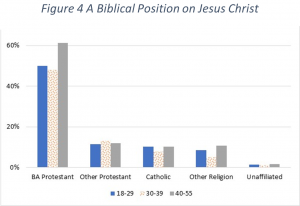 What happens when we look at how many Born Again Protestants take a biblically consistent view on all three of these questions? Consider the results shown in Figure 4. First, we see that young adult Born Again Protestants drop from about two thirds for the individual questions down to about one half when looking at all three questions. It appears that about one half of those categorized as Born Again Protestants are trusting Jesus to save them but do not have a good understanding of biblical teaching on Jesus.
What happens when we look at how many Born Again Protestants take a biblically consistent view on all three of these questions? Consider the results shown in Figure 4. First, we see that young adult Born Again Protestants drop from about two thirds for the individual questions down to about one half when looking at all three questions. It appears that about one half of those categorized as Born Again Protestants are trusting Jesus to save them but do not have a good understanding of biblical teaching on Jesus.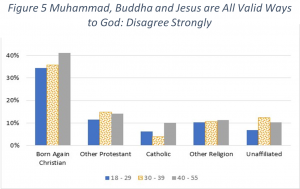 First let’s look at just question number one across the various religious groups, looking for the answer Disagree strongly as shown in Figure 5
First let’s look at just question number one across the various religious groups, looking for the answer Disagree strongly as shown in Figure 5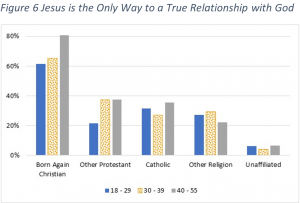 Instead, we asked this second question in a slightly different way but with the same intent: “I believe that the only way to a true relationship with God is through Jesus Christ.” We thought that this question would be
Instead, we asked this second question in a slightly different way but with the same intent: “I believe that the only way to a true relationship with God is through Jesus Christ.” We thought that this question would be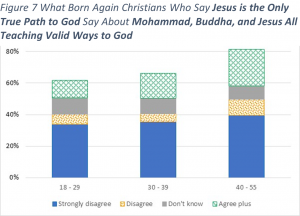 However, the survey respondents show us that one does not have to give answers which logically support one another. Even if some of the respondents misread the statement, the difference between the two is great enough that it is safe to assume that the results are not primarily attributable to misreading.
However, the survey respondents show us that one does not have to give answers which logically support one another. Even if some of the respondents misread the statement, the difference between the two is great enough that it is safe to assume that the results are not primarily attributable to misreading.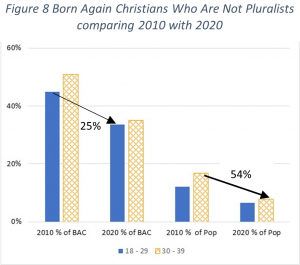 How have the statistics on Born Again Christians and pluralism changed from 2010 to 2020? As shown in the figure, we see a significant drop in the percent of BACs who are not pluralists. Those age 18 to 29 drop by 25% (from 45% to 34% of all BACs) and those age 30 to 39 drop by 31% (from 51% to 35% of all BACs).
How have the statistics on Born Again Christians and pluralism changed from 2010 to 2020? As shown in the figure, we see a significant drop in the percent of BACs who are not pluralists. Those age 18 to 29 drop by 25% (from 45% to 34% of all BACs) and those age 30 to 39 drop by 31% (from 51% to 35% of all BACs).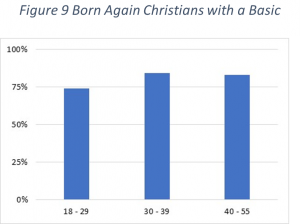 What about that smaller subset of people who have a Basic Biblical Worldview? Do a majority of them also have a pluralistic worldview? The answer is no. As shown, between 75% and 85% of them are not pluralists.
What about that smaller subset of people who have a Basic Biblical Worldview? Do a majority of them also have a pluralistic worldview? The answer is no. As shown, between 75% and 85% of them are not pluralists.